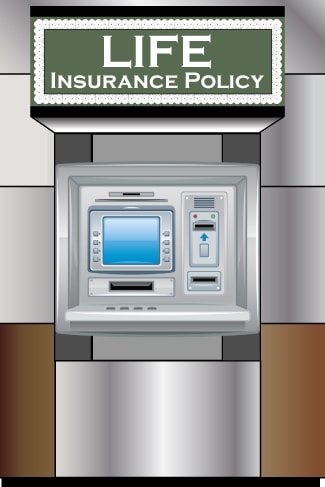Six hints for withdrawing emergency cash from your life insurance policy
Short on funds? Before you swipe a credit card, you may want to consider your life insurance policy.
Permanent life insurance policies, such as whole life or universal life, offer investment components that build cash over time. Once you’ve held the policy for a certain number of years – as indicated in the policy – most insurers will let you borrow against that cash value for any reason.
Taking money from a life insurance policy, however, often is overlooked as a potential source of immediate cash, according to survey by the National Association of Insurance Commissioners. According to the survey, more than two-thirds of consumers were unaware that some types of life insurance include a cash value.

Borrowing from the cash value of a life insurance policy can offer a wide range of perks, including flexible repayment plans and access to funds within five to seven business days, says Robert Loss, owner of The Amwell Agency, an independent insurance brokerage in New Jersey.
Before you tap into the cash value of your policy, you’ll want a thorough understanding of what’s involved. Here are six things to know about borrowing cash from a life insurance policy.
1. It must be a permanent policy.
There are two types of life insurance policies: term and permanent. Term life insurance covers a set period of time; if the person insured dies during that period, a death benefit will be paid to beneficiaries. Because they only cover the death benefit, term life insurance policies tend to have a lower initial cost than permanent policies; after a certain period, however, the policy will need to be renewed. Term life insurance policies do not build cash value over time.
Permanent insurance, on the other hand, combines the death benefit coverage of a term policy with an investment component. These policies remain in effect for as long as you continue to pay premiums, and the cash value continues to build over time. There are four main types of permanent life insurance: whole life, universal life, variable life and variable universal life. You can borrow from a permanent life insurance policy with a cash value, provided you meet the requirements laid out in the policy.
2. It won’t be a new policy.
The first premiums you pay into a life insurance policy usually are used to cover the expenses of the policy, such as the agent’s commission and the company’s overhead, says John Espenschied, owner of CaliforniaLife.com, a division of Insurance Brokers Group LLC. In most cases, it will take one to three years before you begin to see an accumulation of cash.
3. You’ll receive tax benefits.
The biggest benefit of borrowing from a life insurance policy is the tax-free income, says Adam Koos, founder and president of Libertas Wealth Management Group Inc., a wealth planning firm in Ohio. If you take out a loan from the policy, you won’t have to count the funds you receive as income for that year.
4. Your credit history doesn’t matter.
You won’t be denied a loan from the insurance company as you could at a bank, says Scot Ehinger, a financial adviser with New York Life in South Carolina.
The rate you’re charged, which usually is comparable to current market rates, will be the same no matter what your credit score is. Since the cash value of a policy is considered your own money, borrowing against the policy isn’t reported to credit bureaus, Loss says.
5. You’ll have some room to pay the money back.
When borrowing from a life insurance policy, the terms of repayment are flexible and determined by the policyholder, Loss says. In some cases, you’ll need to repay the loan; in others, you may not need to. If you’ve built enough cash value to the point where the interest, or dividends paid, can cover the repayment, you may not have to pay it back, Koos says. Regardless of the loan payments, however, premium payments will need to continue to keep the policy in effect.
6. The loan could affect future benefits.
If you borrow from your policy and die before paying the money back, the money will be deducted from the death benefit. Say you have a $100,000 policy with a cash value of $10,000. If you borrow $5,000 and die before the money has been paid back, your beneficiaries would receive $95,000.
Also, if you don’t repay the loan, the interest due on it could compound to a point where the outstanding balance equals the amount of the remaining cash value in your policy. If that happens, you may be required to make loan payments or additional premium payments to keep the policy in effect, Ehinger says. Talk to your life insurance agent to understand how much you can borrow from the policy without harming future benefits.
